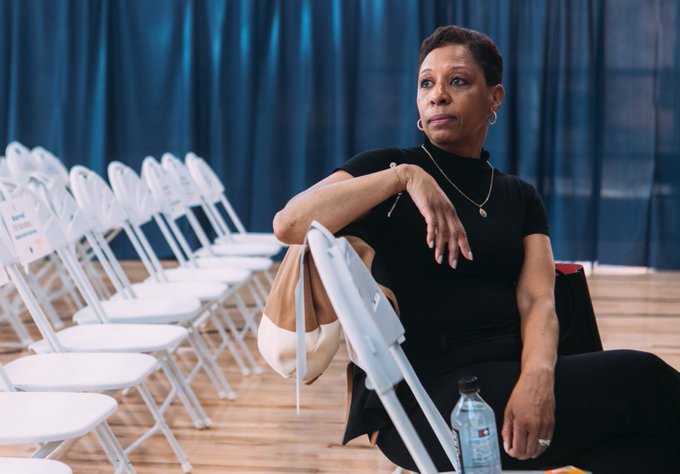Adams will announce a proposal during her State of the City speech Wednesday to support and expand NYCHA tenant-owned businesses, the number of which has jumped significantly in recent years as residents turn to home-based ventures such as catering, child care services and carpentry.

Council Speaker Adrienne Adams’ Office
NYC Council Speaker Adrienne Adams will announce a proposal during her State of the City speech Wednesday that aims to support and expand the growing number of NYCHA resident-owned businesses.New York City Council Speaker Adrienne Adams will announce a proposal during her State of the City speech Wednesday that aims to support and expand the growing number of NYCHA resident-owned businesses.
The proposed legislation, Adams said, aims to help residents save more money without raising their rent or cost of living. It would create a directory of NYCHA tenant-owned businesses as well as marketing materials to spotlight their work, and require the city to launch a public education campaign for NYCHA residents to connect with other startups at public housing facilities throughout the five boroughs.
NYCHA and the City’s Economic Development Corporation (EDC) will also identify vacant or underutilized spaces to host NYCHA pop-up businesses and startups. The EDC would be tapped to give micro-grants as part of the Neighborhood Credit Fund specifically for NYCHA residents to grow their businesses, buy equipment and create jobs for the community.
“There is immense potential everywhere in our great city,” said Adams. “To maximize it, we need to go to the communities that are ripe with talent but underrepresented in spaces of formal entrepreneurship.”
The number of NYCHA residents between the ages of 18 and 62 with a business jumped significantly from 286 residents in 2012 to 1,636 in 2021—a 472 percent increase, according to CUF. Residents maintained home-based ventures such as catering, child care services and carpentry.
A majority of those businesses are informal or not registered due to formalization barriers, making it nearly impossible to track the specifics of their operations, according to CUF.
Still, fewer than 1 percent of all NYCHA tenants had business income as of January 2021, presenting “an unmistakable opportunity” to help more residents build wealth, the report said. In 2019, fewer than half of all working-age NYCHA residents had employment earnings, with average income at just over $27,000 a year, according to CUF. The pandemic has only exacerbated those hurdles.
“The challenges here include a lack of access to capital and technical support, as well as NYCHA’s underutilization of the Family Self Sufficiency program that allows residents to generate their income without raising their rent,” Speaker Adams said in a statement.
The Family Self Sufficiency program, implemented in 1990, works with families and individuals who are looking to gain financial independence through job and education training.
READ MORE: NYC Still Falling Short in Effort to Diversify Contracting, Report Says
Rent for NYCHA is determined yearly during a recertification process and is based on income, assets and expenses. Should a resident report having a business in addition to their employment, their rent can potentially increase because of the additional earnings. But when a participant under the Self Sufficiency program gets a rent increase, NYCHA creates a savings account using the difference between the resident’s old rent and the new rent.
Adams’ bill would require NYCHA to regularly report on the use of the program.
Furthermore, the legislation would call on the New York City Department of Small Business Services to expand its Business Pathways programs, which provides training and resources to NYCHA Section 8 residents and low-income New Yorkers to legitimize their businesses.
Currently, the Business Pathways program is limited to catering and childcare services; fewer than 400 NYCHA tenants graduated from the initiative between 2015 to 2021, according to CUF. The envisioned expansion would include ventures such as retail and cosmetology.
“The next big thing could be at NYCHA and likely is,” Adams said. “Let’s harness the entrepreneurial spirit and connect talent with resources.”
In her speech, Adams is also expected to press the city to build new housing on NYCHA land, calling for the development of both public and private apartments on spaces like gardens and parking lots—an effort to address the city’s affordable housing shortage, the New York Times reported.
The speaker’s address will be livestreamed here starting at noon Wednesday.








